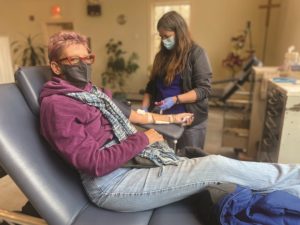PROVINCETOWN — In need of a kidney transplant, Provincetown resident Bo Harris discovered that a rule blocked many of his friends from donating blood to show their support for him and others facing surgery.

The policy, first adopted 39 years ago by the Food and Drug Administration (FDA) during the AIDS epidemic but before HIV had been identified, initially banned blood donations from men who had sex with men at any point after 1977. The rule has been modified twice, and since 2020 gay and bisexual men may donate blood provided that they have not had sex with a man in the past three months.
There is a growing effort to lift the ban completely.
“It is unreasonable that a huge chunk of your population, who is historically very willing to help in other areas, do not have the ability to aid here,” said Steven Latasa-Nicks, a Provincetown resident and local Red Cross disaster action team leader.
“I have people tell me they went in to give blood and didn’t know they wouldn’t be able to,” said AIDS Support Group of Cape Cod President Dan Gates, whose organization was created in the 1980s to respond to the AIDS epidemic and continues to fight for the civil rights of those living with HIV.
“There’s a kind of trauma that is inflicted on someone to experience such a policy,” said Gates. “It’s discriminatory.”
On Jan. 13, Mass. Senators Elizabeth Warren and Ed Markey sent a letter co-signed by 20 other U.S. senators to the FDA urging a change. “We must adopt evidence-based policies focused on the assessment of an individual’s risk, not inaccurate and antiquated stereotypes,” they wrote.
FDA spokesperson Veronika Pfaeffle told the Independent the letter was received and that the FDA will be responding to the senators “directly.”
American Medical Association President Gerald Harmon followed on Jan. 26 with a statement calling for an end to the ban and suggesting evaluation of donors “on an equal basis of individual risk factors, without regard to sexual orientation or gender identity.”
With the pandemic leading to canceled blood drives across the country, the FDA’s policy is now making a bad situation worse. There has been a 10-percent decrease in the number of blood donors since March 2020, causing the largest shortage of blood in over a decade, said Mass. Red Cross Director of Communications Kelly Isenor.
“There’s a real potential that blood might not be available when we need it,” said Isenor. “Blood can’t be stockpiled. It’s perishable.”
According to a 2014 study at UCLA’s Williams Institute, lifting the blood donation ban against gay men would increase the annual blood supply by 2 to 4 percent, adding up to 600,000 pints of blood to the supply each year.
In 1983, when the FDA enacted its initial lifetime ban on blood donation for men who had sex with other men, the HIV virus was not yet known and there was no way to test for it in blood donations.
“Today, every unit of donated blood is rigorously tested to detect any trace of HIV, syphilis, hepatitis, West Nile virus or other blood-borne diseases,” wrote the AMA’s Harmon.
But the FDA argues that, while testing is effective, risk of HIV transmission exists due to a gap between the time when a person may have been exposed and when a test can detect whether they have had the virus.
“Developing the scientific information that is needed to further change blood donor policies does take time and effort,” Pfaeffle said, defending the FDA’s gradual shift and continuing research on the rule.
Underway now is an FDA-funded pilot study conducted by the nation’s largest blood centers, the Red Cross, Vitalant, and OneBlood. The study aims to determine whether a donor history questionnaire based on individual risk would be as effective as a time-based deferral in reducing the risk of HIV in the blood supply.
In the past year, several countries including France, Greece, and Israel have lifted similar restrictions, opting for comprehensive risk assessments.
Harris, who successfully got his kidney last April, has since become an advocate for those undergoing similar procedures. He is shocked by the FDA’s “archaic” policy.
“The rules bar a very generous, giving, and loving part of the population,” Harris said. “Are there not tests for HIV in the blood supply? Of course there are. Can’t straight people or lesbians get and transmit HIV? Of course they can. But only gay men are targeted? It’s absurd.”
Upcoming Blood Drives
The American Red Cross and Cape Cod Healthcare both organize blood drives on Cape Cod, though there’s only one brick-and-mortar center on the Cape: the Nicholas G. Xiarhos Blood Donor Center at Cape Cod Hospital.
“All the blood we collect is used exclusively for our patients at Cape Cod Hospital in Hyannis or Falmouth Hospital,” said Cape Cod Healthcare’s Jonathan DeCoste. Red Cross donations are taken to a lab in Dedham for testing and hospitals can purchase the blood from there.
Blood donation is by appointment only. A full list of upcoming blood drives across the Cape can be found at capecodhealth.org/ways-to-give/blood-center/upcoming-blood-drives. Those closest to the Outer Cape are listed here:

Friday, Feb. 25
- Cape Cod Healthcare, Orleans Police Station, 99 Eldredge Park Way, 10 a.m. to 4 p.m.
- American Red Cross, Brewster Baptist Church, 1848 Main St., 1 to 5:30 p.m.
Tuesday, Mar. 8
- Cape Cod Healthcare, Northside United Methodist Church, 701 Airline Road, Brewster, 10 a.m. to 4 p.m.
Wednesday, Mar. 9
- Cape Cod Healthcare, Chatham Works, 323 Orleans Road, noon to 6 p.m.
Tuesday, Mar. 15
- Cape Cod Healthcare, Brewster Police Station, 631 Harwich Road, 11 a.m. to 5 p.m.



